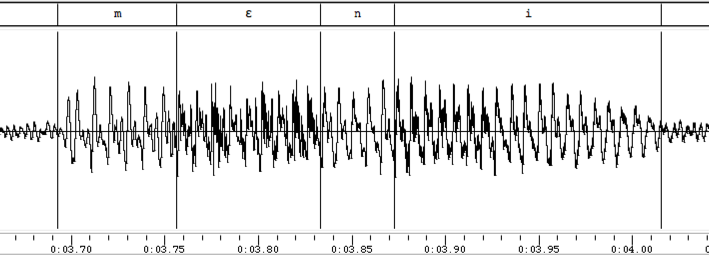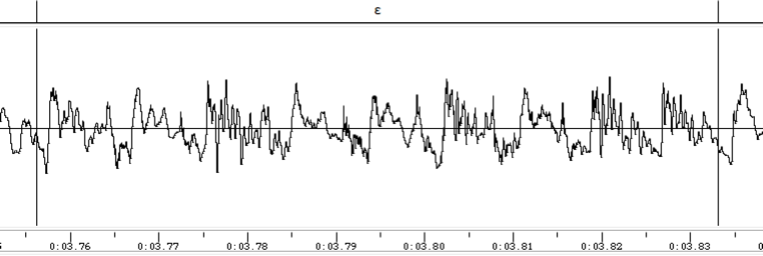Restless creak
« previous post | next post »
Jeep's Superbowl commercial:
[No longer available at YouTube]
Patricia Irwin wrote:
Did you see the creaky voice Jeep ad? It's a guy doing the voiceover. To me it was really striking, though I wonder if it would just sound normal to younger people.
Tricia mentioned the speaker's gender in reference to last year's discussion of Lake Bell's description of the alleged "Sexy baby vocal virus", which included creaky voice; or the discussion a couple of years earlier about an alleged vocal fry fad among young adult American women.
Here's the first phrase of the Jeep voiceover:
And a waveform plot of the the word many, illustrating the irregularity of glottal pulses:
Zeroing in on the stressed vowel [ɛ]:
But I'm still not convinced that there's a generational change here, gendered or not. There are physiological, situational, and communicative reasons for people of whatever age to exhibit creaky voice and/or vocal fry. The low-pitched and somewhat hoarse voice-over works in this ad — but creak and fry also work, though in a somewhat different way, in this year's Bob Dylan Chrysler commercial — and even more strongly in Clint Eastwood's 2012 "Halftime in America" commercial:
Eastwood's climax:
The details of low-range pitch and vocal irregularity are different in each case, and the interpretation is somewhat different as well, but I remain to be convinced that "kids today" are deploying these vocal features at a higher rate or in a different way compared to previous generations — or for that matter compared to older people right now.
I could well be wrong about this, but it would take some evidence to convince me.


Victor Mair said,
February 3, 2014 @ 9:23 am
So far back as I can remember, Clint Eastwood always talked like that. When I first heard him do it, I thought that it might have been affected, so as to convey tough guy earnestness. But then I thought that it might have been a physiological, physical impairment. Still later, I have come to believe that his creaky voice is just his nature, the way he is.
I, on the other hand, cannot sustain a convincing creaky voice for more than two or three words, even when I try really hard.
Tim Leonard said,
February 3, 2014 @ 9:50 am
What struck me is not the creaky voice, but the text: "Genetics have a voice that you can only deny so long." Say what? Since when is genetics plural?
Josef Fruehwald said,
February 3, 2014 @ 10:36 am
Noam Chomsky is also a good example of an older generation (DOB 1928) who is prolific user of creaky voice.
https://www.youtube.com/watch?v=nInnK7pCHIQ
KeithB said,
February 3, 2014 @ 11:21 am
ISTR that Linda Hunt was pretty creaky in "Year of Living Dangerously"
tapsa said,
February 3, 2014 @ 11:45 am
That's how I, as a Finn, would say young Americans generally speak, at least since the 90s.
Although I have noticed many Jewish-Americans employ a similar tone tone – Mel Brooks, Chomsky, David Schwimmer of Friends fame come to mind.
Ralph Hickok said,
February 3, 2014 @ 12:34 pm
Does anyone else remember Mason Adams, who did tons of commercials in the 1960s and 1970s? He may be best remembered for Smucker's, but he did many others and he was also Lou Grant's managing editor. He was certainly no youngster when his career was at its peak.
http://www.youtube.com/watch?v=kSd7t8qeqvs
Mr Punch said,
February 3, 2014 @ 3:13 pm
The accent's not right, but the voice in the ad reminded me of Bill Clinton.
Y said,
February 3, 2014 @ 10:07 pm
This creak has is not just a 'clean' creak, which might look like a normal waveform with subharmonics. This has a lot of noise in it, which seems to be correlated with the glottal pulses: glottal periods are either noisy throughout, or not very noisy. Maybe chaotic noise?
[(myl) In the usual terminology, "creak" means pitch that's low enough that individual glottal pulses can be semi-resolved by the ear, creating a "creaky" sound; "fry" refers to a chaotic pattern of oscillation, where individual pulses come quasi-randomly, like the pops of vaporizing water droplets in hot oil during frying.
Chaos (here as typically in non-linear systems) is often the end point of period doubling, so "creak" and "fry" are often intimately related.
In addition, there may be periods of time during which the vocal folds come close together but don't completely seal off the flow of air, creating turbulence that is perceived as breathiness, hoarseness, or whispering.
In all of the examples shown in the post, all of these things are happening to some extent.]
Annie Pearson said,
February 4, 2014 @ 4:12 pm
I think it's being used commonly as an aural marker for 'authentic' – equivalent to a singer putting a 'No AutoCorrect Used' label on a music release.
Lazar said,
February 4, 2014 @ 6:24 pm
@Tim Leonard: I can't say that I've heard plural "genetics" until this ad, but it doesn't really surprise me because I've heard plural "politics" as well. I think these "-ics" nouns are sufficiently rare as subjects that people feel confused about what number to give them.
blah said,
February 5, 2014 @ 5:43 am
Several nouns that end in "-ics" may be construed as singular or plural depending on how they are used.
Consider "acoustics," "athletics," "ethics," "politics," "tactics," "statistics," or "genetics." When they refer to a science or domain of study, they are generally considered singular. When they refer to individual acts, traits, beliefs, or things, then they are generally considered plural.
So "genetics" as the study of biological heredity would be singular; "genetics" as a group of genes would be plural. I think the usage here is acceptable.
Azimuth said,
February 6, 2014 @ 5:00 pm
Who can say why the young creak and fry? Or sport bed-head haircuts? Or the knit hats that conceal them?